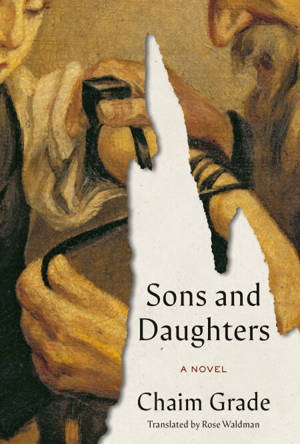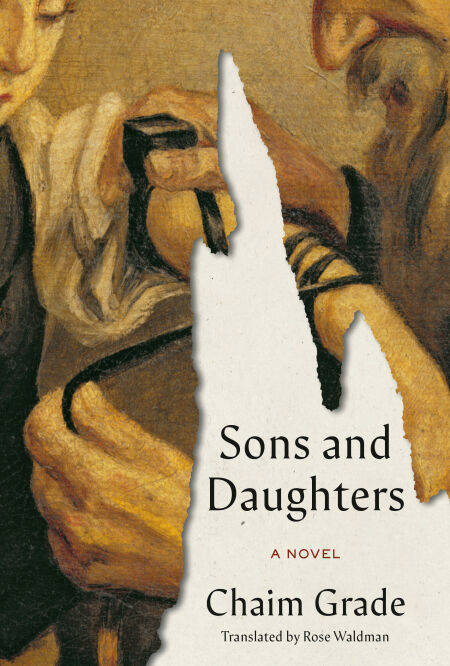
- Retrait gratuit dans votre magasin Club
- 7.000.000 titres dans notre catalogue
- Payer en toute sécurité
- Toujours un magasin près de chez vous
- Retrait gratuit dans votre magasin Club
- 7.000.0000 titres dans notre catalogue
- Payer en toute sécurité
- Toujours un magasin près de chez vous
Description
From “one of the great—if not the greatest—contemporary Yiddish novelists” (Elie Wiesel), the long-awaited English translation of a work, Tolstoyan in scope, that chronicles the last, tumultuous decade of a world succumbing to the march of modernity
“A great beard novel . . . Also a great food novel . . . A melancholy book that also happens to be hopelessly, miraculously, unremittingly funny . . . [Grade’s] fretful characters vibrate as if they were drawn by Roz Chast [and] Rose Waldman's translation seems miraculous to me.” —Dwight Garner, The New York Times
“It is me the prophet laments when he cries out, ‘My enemies are the people in my own home.’” The Rabbi ignored his borscht and instead chewed on a crust of bread dipped in salt. “My greatest enemies are my own family.”
Rabbi Sholem Shachne Katzenellenbogen’s world, the world of his forefathers, is crumbling before his eyes. And in his own home! His eldest, Bentzion, is off in Bialystok, studying to be a businessman; his daughter Bluma Rivtcha is in Vilna, at nursing school. For her older sister, Tilza, he at least managed to find a suitable young rabbi, but he can tell things are off between them. Naftali Hertz? Forget it; he’s been lost to a philosophy degree in Switzerland (and maybe even a goyish wife?). And now the rabbi’s youngest, Refael’ke, wants to run off to the Holy Land with the Zionists.
Originally serialized in the 1960s and 1970s in New York–based Yiddish newspapers, Chaim Grade’s Sons and Daughters is a precious glimpse of a way of life that is no longer—the rich Yiddish culture of Poland and Lithuania that the Holocaust would eradicate. We meet the Katzenellenbogens in the tiny village of Morehdalye, in the 1930s, when gangs of Poles are beginning to boycott Jewish merchants and the modern, secular world is pressing in on the shtetl from all sides. It’s this clash, between the freethinking secular life and a life bound by religious duty—and the comforts offered by each—that stands at the center of Sons and Daughters.
With characters that rival the homespun philosophers and lovable rogues of Sholem Aleichem and I. B. Singer—from the brooding Zalia Ziskind, paralyzed by the suffering of others, to the Dostoyevskian demon Shabse Shepsel—Grade’s masterful novel brims with humanity and heartbreaking affection for a world, once full of life in all its glorious complexity, that would in just a few years vanish forever.
“A great beard novel . . . Also a great food novel . . . A melancholy book that also happens to be hopelessly, miraculously, unremittingly funny . . . [Grade’s] fretful characters vibrate as if they were drawn by Roz Chast [and] Rose Waldman's translation seems miraculous to me.” —Dwight Garner, The New York Times
“It is me the prophet laments when he cries out, ‘My enemies are the people in my own home.’” The Rabbi ignored his borscht and instead chewed on a crust of bread dipped in salt. “My greatest enemies are my own family.”
Rabbi Sholem Shachne Katzenellenbogen’s world, the world of his forefathers, is crumbling before his eyes. And in his own home! His eldest, Bentzion, is off in Bialystok, studying to be a businessman; his daughter Bluma Rivtcha is in Vilna, at nursing school. For her older sister, Tilza, he at least managed to find a suitable young rabbi, but he can tell things are off between them. Naftali Hertz? Forget it; he’s been lost to a philosophy degree in Switzerland (and maybe even a goyish wife?). And now the rabbi’s youngest, Refael’ke, wants to run off to the Holy Land with the Zionists.
Originally serialized in the 1960s and 1970s in New York–based Yiddish newspapers, Chaim Grade’s Sons and Daughters is a precious glimpse of a way of life that is no longer—the rich Yiddish culture of Poland and Lithuania that the Holocaust would eradicate. We meet the Katzenellenbogens in the tiny village of Morehdalye, in the 1930s, when gangs of Poles are beginning to boycott Jewish merchants and the modern, secular world is pressing in on the shtetl from all sides. It’s this clash, between the freethinking secular life and a life bound by religious duty—and the comforts offered by each—that stands at the center of Sons and Daughters.
With characters that rival the homespun philosophers and lovable rogues of Sholem Aleichem and I. B. Singer—from the brooding Zalia Ziskind, paralyzed by the suffering of others, to the Dostoyevskian demon Shabse Shepsel—Grade’s masterful novel brims with humanity and heartbreaking affection for a world, once full of life in all its glorious complexity, that would in just a few years vanish forever.
Spécifications
Parties prenantes
- Auteur(s) :
- Traducteur(s):
- Editeur:
Contenu
- Nombre de pages :
- 704
- Langue:
- Anglais
Caractéristiques
- EAN:
- 9780593318140
- Date de parution :
- 24-03-25
- Format:
- Ebook
- Protection digitale:
- Adobe DRM
- Format numérique:
- ePub

Les avis
Nous publions uniquement les avis qui respectent les conditions requises. Consultez nos conditions pour les avis.






